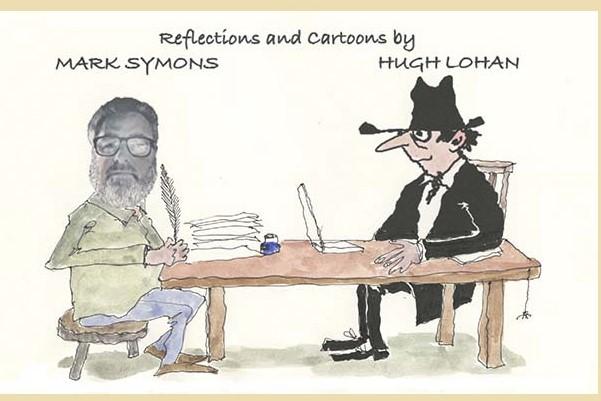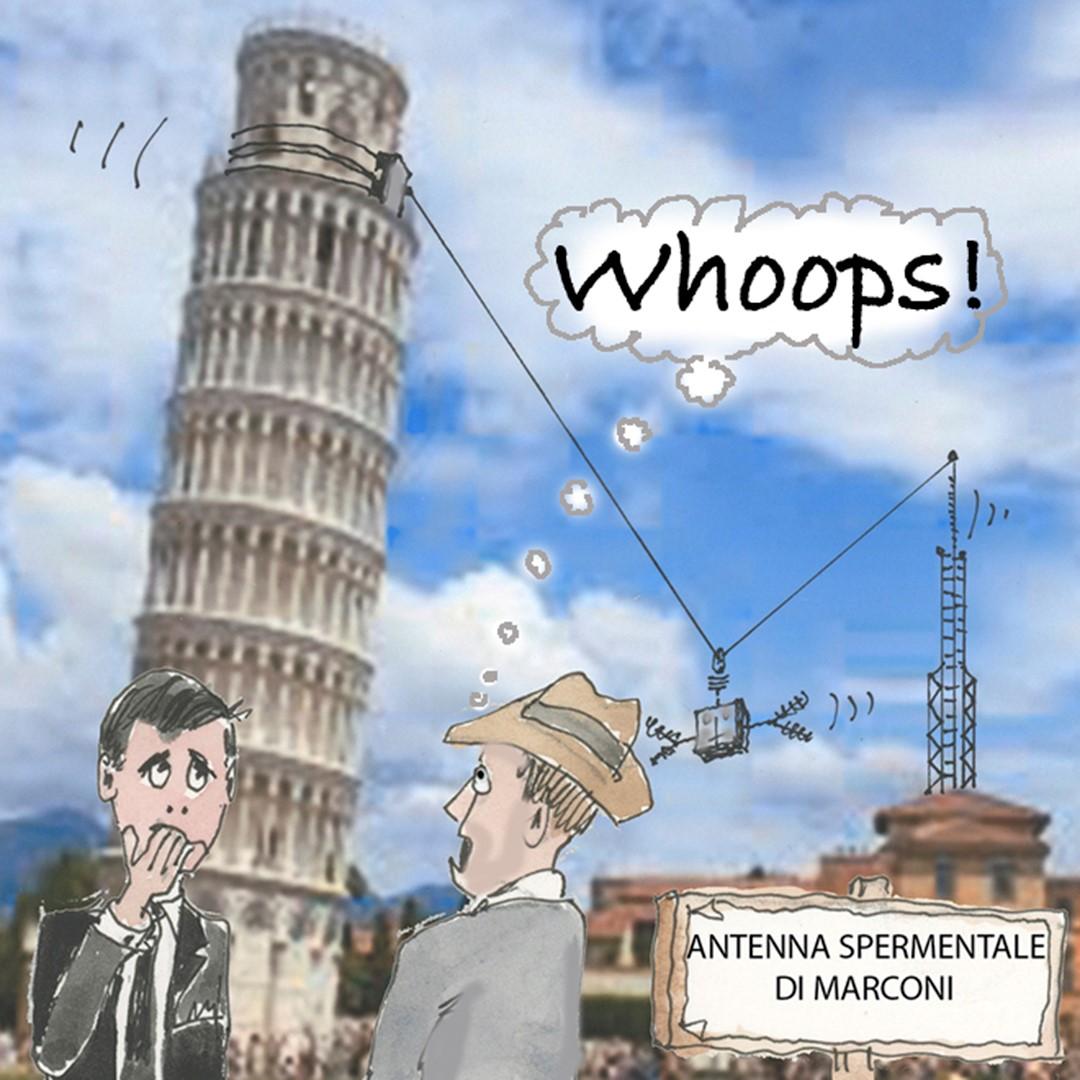Guglielmo Marconi. A pioneer of communication.
The New Forest owes a great deal to his brilliance - and his persistence!

Moving on from pioneers in aviation last week to communications this, clever writer and cartoonist duo Mark and Hugh take us on an entertaining tour featuring the brilliant Mr Marconi who in his many significant and historic achievements also proved that persistence pays - which can be applicable to us all! Read on and enjoy!
"These days we take it for granted that we can phone anybody, anywhere, at any time; well almost.
The pinpoint accuracy of global positioning systems mean that air and sea transport is now almost completely dependent on the precise calculation of radio signals sent between satellites and the user. My wife and I recently went on a cruise. During dinner I spoke to the captain about navigation old and new. He told me that only a minority of shipping lines carried paper charts. The rest? Just a memory card. These electronic charts combined with the wonder that is radio waves mean that navigation is no longer a job for sextant, binoculars or compass.
This radio wave revolution started with a determined young Italian called Guglielmo Marconi.
Remember semaphore? Me neither.
The desire to communicate has always been with us but prior to Marconi the methods at our disposal were often rather primitive. Just down the road from where I used to live in West End, Southampton, is a feature called Beacon Hill. Back in the sixteenth century if an invading enemy was spotted coming across the channel, beacons would be lit in sequence from the south coast to London. This was the early warning system of the time. Many of us remember the two cocoa tins and the piece of string from our childhood. But what about smoke signals or perhaps the flags of the Royal Navy, once famously ignored by Nelson.
There must be a beginning of any great matter, but the continuing unto the end until it be thoroughly finished yields the true glory. Francis Drake.
The telephone came into being in 1876, two years before the birth of Marconi and just ten years before Mr Benz gave the world its first motor car. The Wright brothers achieved powered flight in 1903. These were heady times for inventors. Marconi wasn’t the first to discover the basic principles of radio communication. Others had managed this up to fifty years previously, but what Marconi did, as the great Admiral once said, was to continue unto the end. Inventors back then were often people of independent means. Perhaps you can imagine that after a twelve-hour shift in a factory your brain might not be terribly fertile. Or functioning. However, amongst the privileged elite Marconi was a cut above the average inventor. He was determined and, step by step, made his way towards the mastery of wireless communication. His first transmission was made at the age of twenty-one when, at his father’s estate in Italy, he managed to communicate wirelessly over a distance of one and a half miles. For this particular young man this was just the beginning. He wrote to the Italian Government explaining what he had achieved and asked for funding; they treated him as if he were a lunatic. Luckily for him (and us) our Civil Service, with foresight, recognised a good thing when they saw one. Which country do you think agreed to fund further research by this talented young man? England!
I have nothing to declare but my genius. Oscar Wilde replying to a US customs agent.
In addition to the well-known ‘death and taxes’ aphorism we should add ‘customs and revenue’. Marconi was stopped at Dover and his equipment examined in detail. Immediately afterwards the customs officer contacted the Admiralty. Following this the senior electrical engineer for the Post Office, a William Preece, came down from London and stayed in close contact with Marconi. This attention was either driven by plain good manners or, perhaps the fact that this twenty-one-year-old man was on the brink of something big and our government wanted to be there when it happened. Marconi experimented a great deal in the UK gradually increasing the distance of his transmissions. One of the sites he used for his experiments was The Haven Hotel at Sandbanks, Poole. It’s still there, just around the corner from the chain ferry, though the enormous aerial is long gone.
Just two years after his arrival in England the British Lightship Service authorised the use of radio between the South Foreland lighthouse and the East Goodwin lightship. One year later in 1899 the first ever SOS to be sent by radio was used to summon the Ramsgate lifeboat to aid the stricken vessel Elbe which had run aground on Goodwin sands. This young Italian was already beginning to make a difference.
Persistence. The difference between a pass and a fail.
A while back I decided to attend evening classes for a technical qualification which would help me to gain promotion at work. That was fun, working a ten-hour day, getting home to help my wife with the twins, grab some supper and then dash out again for a further two hours of concentration.
For the first of the two-part course I revised every night and I passed with distinction. For the second part I didn’t revise and managed an ordinary pass. Persistence wins every time. Marconi persisted in his many experiments achieving incremental improvements as he went. Competitors could only rue their lack of industry and invention as the young Italian forged ahead. The name Marconi became inextricably linked with radio much in the same way that the name Hoover would forever be associated with the vacuum cleaner.
Many of his experiments were carried out in our area as his main focus was on communication with ships. On the Needles there is a plinth which marks the spot where Marconi erected a 168-foot-high mast. He used this to communicate with two Lymington based paddle steamers which he chartered for the project. The steamers made their way between Swanage Pier, Bournemouth Pier and Alum Pier. He made notes as the experiments went along and, above all, he persisted. He also communicated with the Royal Yacht and Osborne house. I can just imagine the reply.
“Have you transmitted far?”
Read more about Marconi and his experiments involving the Lymington-Yarmouth ferries here!
A Titanic endorsement.
The tragic story of the Titanic disaster is a lesson to us all. The ‘unsinkable’ ship was sadly no match for nature in the form of a huge iceberg. During the inquiry into the massive loss of life the owners were asked why there were insufficient lifeboats for the number of passengers on board. The response was simply that under present Board of Trade regulations they weren’t obliged to provide them. Thank goodness the rules have been changed for the good. Marconi’s company had installed a wireless station with two radio operators onboard the Titanic. Marconi himself had been offered a free passage to the US on board the vessel but had turned it down in favour of a trip onboard the Lusitania. What luck.
During the period between when the Titanic struck the iceberg and when she sank, the radio operators Jack Phillips and Harold Bride transmitted distress signals constantly. They stopped when they no longer had power. Their calls reached the SS Carpathia which immediately steamed south for two hours in order to reach the disaster site. After rescuing seven hundred people and recovering three hundred bodies from the water, she set course for New York.
Good news spreads fast but bad news spreads faster.
The media frenzy at the arrival of the Carpathia in New York was intense. At the time print was king, newspaper publishers were very powerful individuals with a lot of money available for the right story. Journalists, aboard a great number of chartered tugboats that crowded the harbour, shouted through megaphones at passengers aboard the Carpathia. They were offering between fifty and one-hundred dollars for an eye witness account, at the time the average weekly wage was just sixty dollars. Harold Bride was one of the survivors and as he approached New York aboard the Carpathia the wily Marconi sent a radio message to him saying that regarding the media he should hold out for a four-figure dollar sum.
To the victor, the spoils.
During the inquiry into the Titanic disaster Britain’s postmaster general stated that Marconi and his marvellous invention had saved many lives.
Thanks to Guglielmo Marconi, Britain entered WW1 with radio communications equipment far superior to that of the German forces. He died at sixty-one after his ninth heart attack but his memory lives on each time we speak wirelessly.

More tales and cartoons for Lymington and the New Forest from Mark and Hugh
If you enjoy these skilfully told tales and cartoons and you don't already receive our Weekly What's On e-newsletter to receive each week's as it's published - sign up here!
Meanwhile, if you'd like to read previous articles on diverse subjects written by Mark and illustrated by Hugh's cartoons here they are, click the links embedded in the titles:
Equality in the skies
Bees pollinators par excellence
Cordless home entertainment
The joy of sheds
When the Isle of Wight was just Wight
Bucklers Hard
Salisbury Cathedral
Pond Life in our Forests
Bombs Away
Baileys Hard
Rufus Stone and Sir Walter Tyrrell
Graffiti through the ages
Freedom of the roads
Heath fires
Lymington Lido
Watch the birdie
Unstoppable momentum of nature
Socially distanced socialising
Calshot Spit, a curse for mariners...

